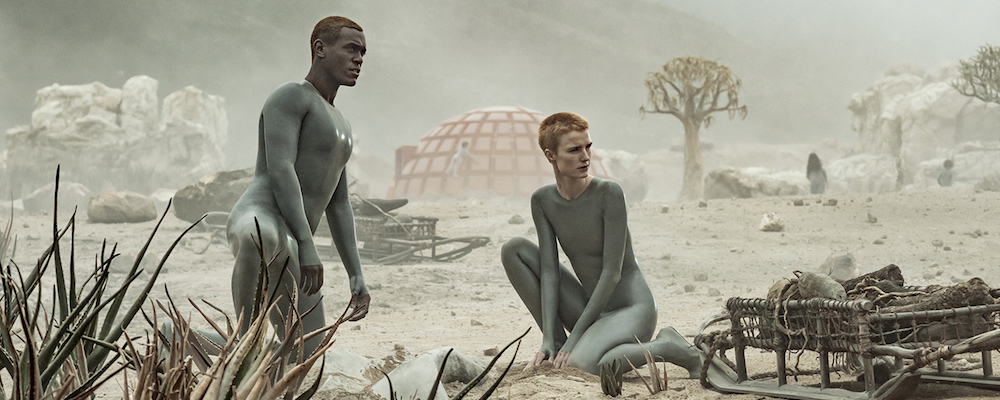HBO Max’s ‘Raised by Wolves’ Imagines a Visually Haunting Future of Clashing Beliefs
Alci Rengifo
With science fiction it’s always about the ideas. Good sci-fi stimulates the mind and the senses. HBO Max’s “Raised by Wolves” is more about the idea rather than the dramatic experience. It instantly aims for being relevant, combining its central plot with themes about religion and atheism. This series also has visual richness to spare, which should come as no surprise with Ridley Scott serving as producer and directing the first two episodes. With his slick eye, Scott imagines the future as something not too far off from where we are now.
It’s the future and Earth has been ravaged by what sounds like a civil war sparked between atheists and believers in a higher power called Soul. The igniting factor was the creation of androids and whether they should be allowed to care for humans or have equal treatment. Their side was supported by the atheists, believers belong to a group called the Mithraic, who have created a spaceship/ark to preserve what’s left of humanity and seek a new planet to colonize. That planet might be Kepler-22B, where two androids, Mother (Amanda Collin) and Father (Abubakar Salim) land and make a settlement with the intention of breeding new humans, raising them in atheist rationality and hopefully kick start a new society. But out of a first batch of children, created through an external process out of “The Matrix,” only one survives, Campion (Winta McGrath). As Mother seems beset by grief over the loss of the other children, Father tries to make contact with the ark ship now approaching Kepler, because he reasons Campion might do better being raised by other humans. Mother won’t have any of that, however, and takes drastic steps just as a band of Mithraic explorers arrive.
“Raised by Wolves” is an engaging but odd combination of sharp science fiction and clunky world building. The best thing about it is the visual elegance and ideas. Fans of Scott’s films will recognize the saturated otherworldly look typical to titles like “Prometheus” and the underrated “Alien: Covenant,” where gritty terrains commingle with slick machinery. But the androids lack the eerie sense of deeper dimensions Michael Fassbender’s David displayed in those movies. The writing by creator Aaron Guzikowski, who penned the movie “Prisoners” and a recent “Papillon” revival, gives Mother and Father the humorless tone of walking essays. Even when they show hints of emotion, such as sadness and pain, they sound like cold Wikipedia entries. Of course, they are supposed to be machines, but the trick in previous android-themed films and shows, like “Star Trek” and “A.I.,” is to challenge the viewer with the idea of how a humanoid machine could generate sympathy. Throughout the first six episodes of this first season, Campion and the Mithraic humans feel more engaging than the two main androids. Father generates slightly more empathy because one of his features is that he is prone to making bad jokes. Two of the Mithraic, Marcus (Travis Fimmel) and Sue (Niamh Algar), play atheists who stole the identities of believers to escape on the ark, not knowing they would also have to be responsible for the believers’ son, Paul (Felix Jamieson). Their storyline is infinitely more intriguing than the androids’, because of the implications of pretending to be believers and having to care for Paul. They also have one of the season’s most entertaining speculative moments, when we see what on the go plastic surgery will look like in the future.
A lot of “Raised by Wolves” also feels like a prequel or prologue. Many recent shows, like HBO’s own “Perry Mason,” have premiered as set-ups for the bigger picture to come. This one is no different. Most of this season is set on the arid Kepler planet with few insights into how the world devolved into chaos back on Earth. We get lots of flashbacks revealing a little more about Mother and Father, including past love affairs involving possible human counterparts. It’s all very cryptic and done with some stunning visual sequences, like a love scene in episode six that ends with overhead portals opening into space and cascades of a white liquid that seems to be the androids’ inner fuel. Early on, Mother has a meltdown and attacks the Mithraic ark, carrying out a massacre with a banshee-like energy blast that turns humans into bloody implosions, and brings back a new group of human kids back to Kepler, to the shock of Father. This turns into a set-up for Paul and Sue staking out the androids’ base to try and get Paul back. It’s not boring, but feels like a recycled story element seen in many other shows. It’s as if “Raised by Wolves” limits itself too much staying stuck on the planet.
With Scott involved this is still well-produced television with its greatest merit being that it has actual ideas. If the story gets clunky, at least some viewers might be inspired to have some intriguing discussions after the end credits. The pilot has some of the more intellectually challenging scenes when Mother tries to raise her children with lessons on rational atheist concepts. With the ongoing culture wars in the U.S., if not the world, “Raised by Wolves” isn’t too off the mark in how it uses science fiction to hit close to home. Like a good novel, it feels like we’re getting the first chapters to a much bigger, better story.
“Raised by Wolves” season one begins streaming Sept. 3 on HBO Max with new episodes premiering every Thursday.

